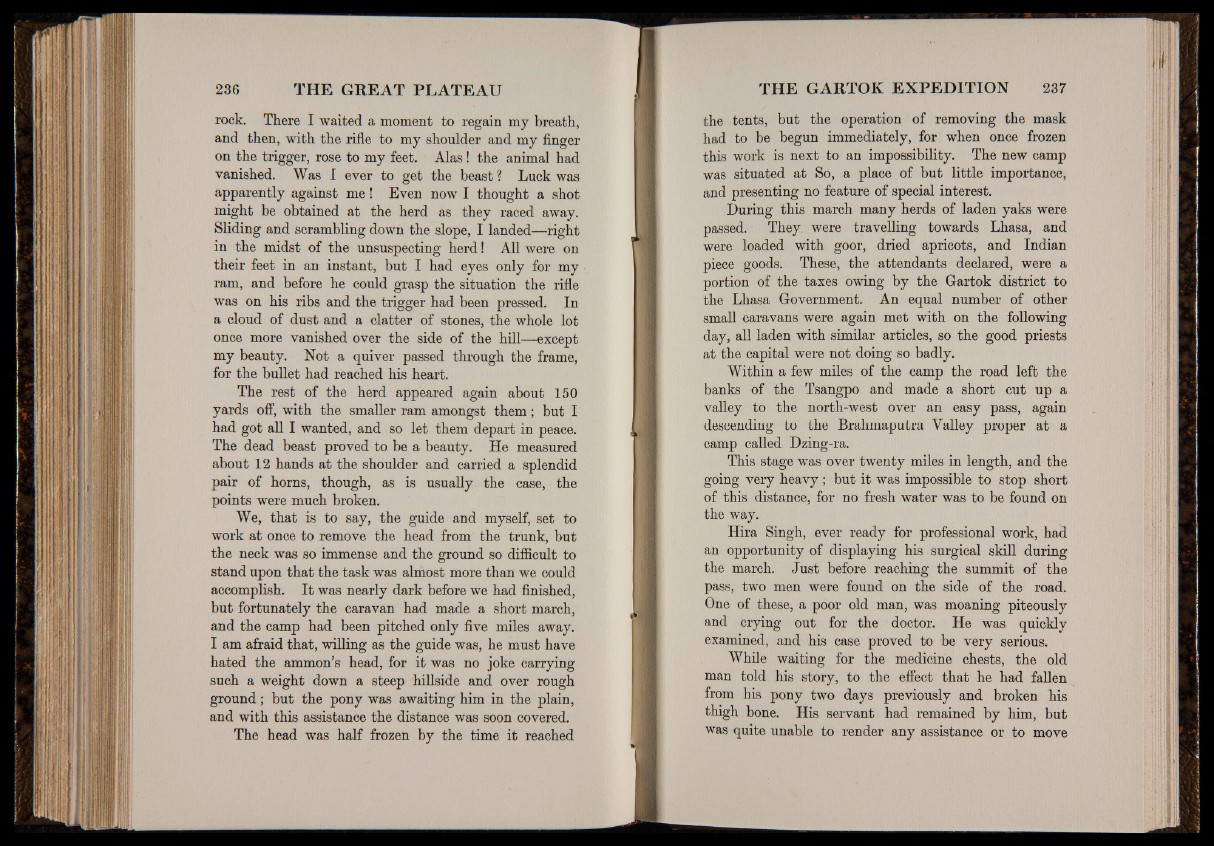
rock. There I waited a moment to regain my breath,
and then, with the rifle to my shoulder and my finger
on the trigger, rose to my feet. Alas ! the animal had
vanished. Was I ever to get the beast? Luck was
apparently against m e ! Even now I thought a shot
might be obtained at the herd as they raced away.
Sliding and scrambling down the slope, I landed—right
in the midst of the unsuspecting herd! All were on
their feet in an instant, but I had eyes only for my
ram, and before he could grasp the situation the rifle
was on his ribs and the trigger had been pressed. In
a cloud of dust and a clatter of stones, the whole lot
once more vanished over the side of the hill—except
my beauty. Not a quiver passed through the frame,
for the bullet had reached his heart.
The rest of the herd appeared again about 150
yards off, with the smaller ram amongst them; but I
had got all I wanted, and so let them depart in peace.
The dead beast proved to be a beauty. He measured
about 12 hands at the shoulder and carried a splendid
pair of horns, though, as is usually the case, the
points were much broken.
We, that is to say, the guide and myself, set to
work at once to remove the head from the trunk, but
the neck was so immense and the ground so difficult to
stand upon that the task was almost more than we could
accomplish. It was nearly dark before we had finished,
but fortunately the caravan had made a short march,
and the camp had been pitched only five miles away.
I am afraid that, willing as the guide was, he must have
hated the ammon’s head, for it was no joke carrying
such a weight down a steep hillside and over rough
ground; but the pony was awaiting him in the plain,
and with this assistance the distance was soon covered.
The head was half frozen by the time it reached
the tents, but the operation of removing the mask
had to be begun immediately, for when once frozen
this work is next to an impossibility. The new camp
was situated at So, a place of but little importance,
and presenting no feature of special interest.
During this march many herds of laden yaks were
passed. They were travelling towards Lhasa, and
were loaded with goor, dried apricots, and Indian
piece goods. These, the attendants declared, were a
portion of the taxes owing by the Gartok district to
the Lhasa Government. An equal number of other
small caravans were again met with on the following
day, all laden with similar articles, so the good priests
at the capital were not doing so badly.
Within a few miles of the camp the road left the
banks of the Tsangpo and made a short cut up a
valley to the north-west over an easy pass, again
descending to the Brahmaputra Valley proper at a
camp called Dzing-ra.
This stage was over twenty miles in length, and the
going very heavy ; but it was impossible to stop short
of this distance, for no fresh water was to be found on
the way.
Hira Singh, ever ready for professional work, had
an opportunity of displaying his surgical skill during
the march. Just before reaching the summit of the
pass, two men were found on the side of the road.
One of these, a poor old man, was moaning piteously
and crying out for the doctor. He was quickly
examined, and his case proved to be very serious.
While waiting for the medicine chests, the old
man told his story, to the effect that he had fallen
from his pony two days previously and broken his
thigh bone. His servant had remained by him, but
was quite unable to render any assistance or to move